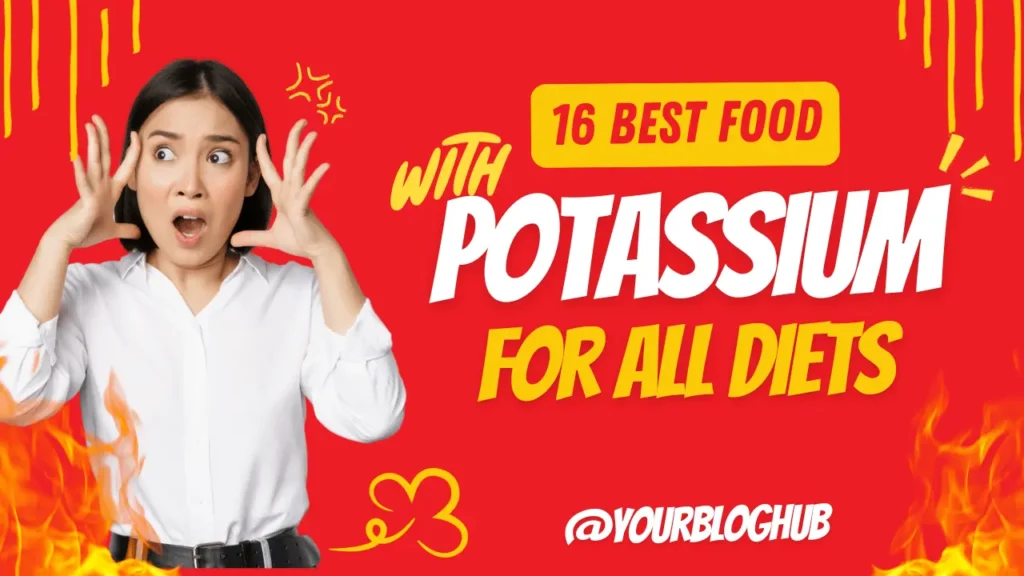Potassium is a necessary mineral that maintains the right balance of fluids in your body. Your risk of kidney stones, stroke, and high blood pressure is decreased by it. To satisfy your needs for potassium each day, you must consume a enough amount of dietary sources.
Table of Contents
Potassium is an element that shouldn’t get much attention. Although it is needed for good cell function, fluid balance, nerve and muscle function, and many other important things, it doesn’t get the attention it needs.
It is very important that you eat enough potassium. Here is a list of the 16 best foods that are high in potassium that you should eat.

16 foods high in potassium
Here are 16 foods that are high in potassium:
- Apricots
- Lentils
- Acorn squash
- Prunes
- Raisins
- Potatoes
- Kidney beans
- Orange juice
- Soybeans
- Bananas
- Milk
- Spinach
- Chicken breast
- Yogurt
- Salmon
- Beef
Apricots
Apricots are a great source of potassium. There are 465 mg of potassium in just 1/4 cup of dried apricots.
But wait, there’s more! Apricots are also a great source of fiber, vitamin A, and antioxidants. You can add them to yogurt, cereal, or sweets. Plus, they’re the perfect pocket snack for when you’re on the go.
Lentils
Move over, meat! Lentils are here to show you that plant-based nutrition can be just as strong! These beans are not only packed with protein but also with potassium, calcium, and iron. Just one cup of cooked beans can provide 731 mg of potassium. It also contain high fiber, protein, and iron levels.
And the great thing about lentils is that they’re cheap, flexible, and tasty. So use them in everything from soups and stews to salads and burgers.
Acorn squash
Acorn squash can be cooked, mashed, or used as a healthy option to fries. This little dinky winter squash is not only deliciously sweet and nutty but also packed with fiber, vitamins, and minerals.
A one-cup dose of cooked acorn squash contains 896 mg of potassium. It’s also a great source of vitamin C, which can help boost your immune system and protect your skin from free radical damage.
Prunes
Prunes may not have the most beautiful image. But these dried plums earn more love, especially when it comes to potassium! Prunes are a potassium powerhouse coming in hot at 293 mg per 1/4 cup. They’re also rich in fiber, vitamin K, and antioxidants, making them a great addition to any healthy diet.
And let’s not forget about their stomach benefits — prunes have long been known to help keep things moving in the gut department. So adding some prunes to your snack mix will boost potassium and keep you normal. Win-win!
Raisins
Raisins, a.k.a. dried grapes, are rich in fiber, antioxidants, vitamins, and minerals. While they’re not the most glamorous food around, they’re a handy snack, and you can add them to sweet and spicy recipes.
Just be careful of amount sizes, as raisins are high in natural sugars, and it’s easy to get carried away! However, a 1/4 cup dose gives 298 mg of potassium, so they’re a sound calorific investment.
Potatoes
Who doesn’t love spuds? Potatoes are a delicious and nutrient-packed food. A single medium-baked potato packs 926 mg of potassium. Wowza!
But that’s not all — potatoes are also a great source of fiber, vitamin C, and other nutrients. Remember to take care with how you prepare them, as loading up on butter, sour cream, and other high-fat sauces can quickly turn this healthy vegetable into a calorie bomb.
Kidney beans
One cup of canned kidney beans boasts 607 mg of potassium. They’re also nutrient-dense, tasty, and at home in all sorts of recipes, like soups, stews, and salads. You can also mash them up with spices and use them as a protein-packed spread on toast or bread, and who can forget chili or bean burgers?
Orange juice
A classic breakfast standard that offers 449 mg of potassium per cup, along with vitamin C, folate, and a bevy of antioxidants.
Yes, it’s healthy, but you need to choose your orange juice wisely, as many store-bought types are loaded with added sugars. To keep your orange juice healthy and potassium-packed, opt for freshly squeezed or 100 percent pure orange juice with no extra sugars or chemicals.
Soybeans
Soybeans have 443 mg of potassium per 1/2 cup, which will keep your nerves and muscles working at full speed. They also pack a lot of nutrition into their tiny bodies.
Add more soybeans to your diet by adding them to soups, salads, and stir-fries, or use soy instead of meat in veggie burgers and tacos. You can even try tofu, which is made from soy beans and is a good source of protein that is high in potassium. You can cook it however you like—on the grill, in the oven, or in a scramble.
Banana
A tasty medium-sized nana has an amazing 422 mg of potassium. In other ways, though, they’re also peeling. They have a lot of fiber, vitamin C and B6, fiber, and antioxidants, which makes them the “top banana” snack for people who are always on the go.
If you want a different kind of banana snack, you could put a popsicle stick in them, dip them in melted chocolate, and freeze them for a cool, potassium-rich treat.
Don’t go crazy, though! While these fruits are full of good things for you, they are also pretty high in natural sugars and calories, so eat them in moderation.
Milk
Not only is 1% milk udderly delicious and low-fat, but it’s also a surprising source of potassium. With about 388 mg of potassium per cup, plus calcium, magnesium, and zinc, drinking 1% milk is an easy way to boost your mineral diet.
Slap it in soups, coffee, tea, or your post-workout recovery drink. You can also milk it for all its worth by using it as a base for homemade soups or sauces.
Spinach
Spinach is the superhero of leafy greens. Not only is it packed with vitamins and minerals, but it’s also a Popeye-approved source of potassium. Oh yes, you’ll get 292 mg of potassium from 2 cups of raw spinach. And if that’s not enough to convince you to pop some spinach in your drink, it’s also rich in iron, a mineral important for transporting oxygen in the blood and supporting the immune system.
Chicken breast
Chicken breast is the lean, mean protein machine that’s a staple of many healthy diets. And with 242 mg in a 3-ounce dose, it’s a clucking good source of potassium. It’s also low in fat and calories, making it a great choice for weight control.
Another great thing about chicken breast is that you can use it in countless recipes. From stir-fries and salads to soups and sandwiches, there’s no end to the delicious ways you can enjoy this lean and healthy meat.
But as with any meat product, handling and cooking chicken safely is important to lower the risk of foodborne sickness.
Yogurt
Looking for a potassi-yummy snack? Grab a yogurt and boost your potassium diet by around 398 mg per 6-ounce dose. And with its calcium, protein, and gut-friendly probiotics, it’s a creamy and healthy treat.
Besides loving a yogurt as is, you can mix in your fave fruits, nuts, or choccy bits to improve its snack status or use it as a base for creamy dips and dressings.
And for those who prefer a plant-based choice, there are plenty of vegan yogurts made from soy milk that also rock potassium.
PSA: Soy yogurt is much lower in potassium, than regular cow’s milk yogurt.
Salmon
Salmon is a fatty, flavorful fish that’s one of the most healthy foods on the world and a fin-tastic source of potassium. With about 534 mg of potassium per 3-ounce dose, salmon is a great way to support healthy muscle and brain function. It’s also packed with B vitamins and omega-3 fatty acids, which are heart-healthy fats that lower inflammation and support brain health.
But if you’re thinking that fresh salmon is too pricey to indulge in regularly, frozen salmon is a more budget-friendly option with similar benefits. You can use it in salads, spreads, or patties for a quick and easy meal that’s just as healthy as fresh salmon.
Beef
Got beef? Maybe you should at 300 mg of potassium in 3 ounces. Beef is a delicious and flexible protein source and a rich source of other important nutrients, like iron, zinc, and vitamin B12. These nutrients are important for keeping healthy red blood cells, supporting immune function, and promoting good brain health.
When choosing beef, opt for lean cuts, such as sirloin or round steak, and prepare it with healthy cooking methods, like grilling, baking, or broiling, to maintain its nutrient content while keeping calorie intake in control.
How much potassium do you need?
You know it’s important, but how much potassium do you actually need? The appropriate intake (AI) for adult men is 3,400 mg per day, and for females, it’s 2,600 mg. But pregnant folks should aim for 2,900 mg, and anyone chestfeeding needs around 2,800 mg per day. It’s worth noting, though, that these are general suggestions, and your needs may change based on your age, activity level, and overall health.
Unfortunately, most Americans fall short of these amounts, with an average intake of around 2,496 mg daily. A diet high in processed, sugary, fatty foods may be low in potassium and other important nutrients, leaving people open to shortages. So, instead of choosing for these less healthy foods, consider adding more potassium-rich whole foods like veggies, fruits, and meats to your meals and snacks.
Can you eat too much potassium?
While potassium is important for health, you can have too much of a good thing. But, if you’re healthy, with normal kidney function, you can’t overdose on potassium as you remove the extra in your pee. This is why experts haven’t set a higher safe limit for potassium. In fact, there is no evidence to say it’s even possible to overdose on potassium from food.
However, folks with kidney problems may have issues as they can’t get rid of extra potassium easily. So it can build up in the blood, called hyperkalemia, and can cause major health problems like irregular heart rhythms or cardiac arrest. That said, be careful of your supplement and salt replacement diet.
Takeaway
Potassium is an essential nutrient that plays a crucial role in health and well-being. From regulating fluid balance and blood pressure to supporting proper muscle and nerve function, potassium is critical for countless bodily processes.
Fortunately, getting enough potassium in your diet isn’t too challenging, as there are plenty of delicious and nutritious foods that can help you meet your daily needs. Try popping apricots and prunes in your morning porridge, grilling salmon and baking spuds for dinner, or sneaking a handful of raisins when you’re peckish There’s no shortage of options to choose from.
Just aim for around 2,600 mg of potassium daily for females or 3,400 mg per day for males, and remember to vary your sources to get a wide range of nutrients in your diet.



